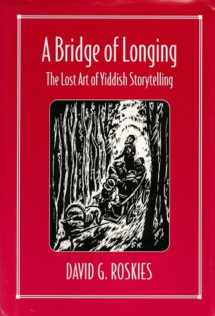
A Bridge of Longing: The Lost Art of Yiddish Storytelling
Book details
Summary
Description
A Bridge of Longing is a compelling history of how Yiddish storytelling became the politics of rescue for successive generations of displaced Jewish artists, embodying their fervent hopes and greatest fears in the languages of tradition. Its protagonists are modern writers who returned to storytelling in the hope of harnessing the folk tradition, and who created copies that are better than the original.
When the cultural revolution failed--as it did for Rabbi Nahman of Bratslaw in the summer of 1806 and for I. L. Peretz in the winter of 1899; for Kiev novelist Sholem Aleichem in 1890 and kibbutz novelist Yosl Birstein in 1960; for Polish-Jewish refugees Isaac Bashevis Singer and Jechiel Isaiah Trunk when they cast ashore in America--there seemed but one route out of the spiritual and creative impasse, and that was storytelling. Yiddish storytelling was a lost art, relegated to obscurity among religious texts and synagogue sermons, then willfully abandoned by Jewish rebels and immigrants seeking more cosmopolitan forms of expression. Thus its recovery is a tale of loss and redemption.
Behind the joyous weddings that end the fairy tales and romances of Rabbi Nahman, I. L. Peretz, Der Nister, and Abraham Sutzkever; beneath the folksy facade of holiday stories by I. M. Dik and Sholem Aleichem, the Bible Poems of Itzik Manger, the demon-monologues of I. B. Singer, there lies, according to David G. Roskies, an aesthetic and moral sensibility totally at odds with the coarse humor and conventional piety of the folk. Taken together, these writers and their deceptively simple folk narratives weave a pattern of rebellion, loss, and retrieval that Roskies calls "creative betrayal"--a pattern he traces from the weddings of Yiddish fantasy to the reinvented traditions of contemporary Jews. His book itself is a delightful expression of the art of storytelling--it is a warm and vivid account.


We would LOVE it if you could help us and other readers by reviewing the book
Book review



